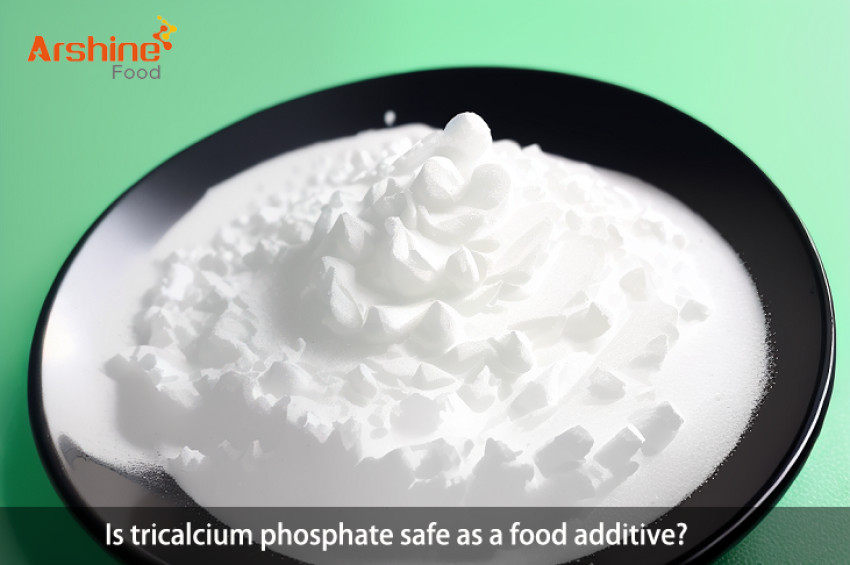
Tricalcium phosphate (TCP) is a food additive that is commonly used in various food and beverage products for its functionality and nutritional properties. It is a calcium salt derived from phosphate rock and is composed of three calcium atoms bonded to two phosphate groups. TCP is primarily utilized as a calcium source and as a texturizer in foods. However, its safety as a food additive has been a topic of discussion and research.
Safety Evaluations: Tricalcium phosphate has undergone extensive safety evaluations by food regulatory agencies such as the U.S. Food and Drug Administration (FDA), the European Food Safety Authority (EFSA), and other global authorities. These evaluations involve a thorough review of scientific studies, toxicological data, and potential adverse effects.
The FDA has granted tricalcium phosphate the status of Generally Recognized as Safe (GRAS), which indicates that it is considered safe for its intended uses in food. EFSA has also evaluated the safety of TCP as a food additive and established acceptable daily intake (ADI) levels. These evaluations aim to determine the amount of TCP that can be consumed daily over a lifetime without posing a significant risk to human health.
Role as a Calcium Source: Tricalcium phosphate is commonly used as a calcium supplement in food products. Calcium is an essential mineral that plays a vital role in maintaining bone health, supporting nerve function, and aiding in muscle contraction. Many individuals, particularly those who are lactose intolerant or have dietary restrictions, may not obtain sufficient calcium from their diets. In such cases, food fortified with tricalcium phosphate can provide an additional source of calcium, contributing to overall nutritional intake.
Texturizing and Anti-Caking Agent: Tricalcium phosphate is also valued for its texturizing and anti-caking properties. In food processing, it can function as an anticaking agent to prevent the formation of lumps in powdered products. This is particularly useful in products like powdered drink mixes, baking mixes, and spices. Additionally, TCP can contribute to improved texture in foods like processed cheeses, as it helps maintain a smooth and uniform consistency.
Bioavailability of Calcium: One important aspect of using tricalcium phosphate as a calcium source is its bioavailability, which refers to the extent to which a nutrient can be absorbed and utilized by the body. Calcium bioavailability is influenced by factors such as the presence of other nutrients in the food matrix, the individual's age, and their physiological status. Tricalcium phosphate is generally considered to have good bioavailability, meaning that a significant portion of the calcium it provides can be absorbed and utilized by the body.
Potential Health Concerns: While tricalcium phosphate is generally recognized as safe for consumption, there are certain considerations to keep in mind. Excessive intake of calcium, whether from natural food sources or supplements, can lead to hypercalcemia, a condition characterized by elevated levels of calcium in the blood. Hypercalcemia can have various symptoms such as kidney stones, gastrointestinal disturbances, and impaired kidney function.
It's important to note that the levels of tricalcium phosphate used in food products are carefully regulated and intended to be safe within normal dietary consumption. However, individuals who take calcium supplements, consume a high-calcium diet, or have certain medical conditions should be cautious to avoid exceeding recommended daily calcium intake levels.
Conclusion: Tricalcium phosphate is a food additive that is widely used for its role as a calcium source and its texturizing properties. Extensive safety evaluations by regulatory agencies support its safe use in food products. As with any food additive or nutrient, moderation is key to ensuring its benefits without the risk of potential adverse effects. For individuals with specific health concerns or those considering significant dietary changes, consulting with healthcare professionals can provide personalized guidance on calcium intake and its sources. Overall, tricalcium phosphate contributes to the nutritional quality and functionality of a variety of foods while being considered safe when used within established guidelines.
https://www.arshinefood.com/Industry-information/is-tricalcium-phosphate-safe-as-a-food-additive




